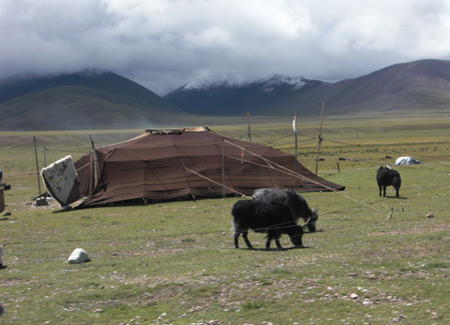Julianne's Diary: Day Nine-Lhasa to Namco Lake and back to Lhasa
2009-09-29 17:22 BJT
By Julianne Page
BEIJING, Aug. 28 -- As we left Lhasa this morning and headed north we came across an almost endless row of military trucks lining the street on the way out of town. Arriving by procession on the other side were modern style military vehicles. I remain curious about why there were so many, what they were doing and where they were going.

The stunning scenery of Namco Lake. (Photo: CRIENGLISH.com)
As the trucks were parked, we managed to get past them and eventually made our way out of Lhasa for the four-hour drive to Namco Lake, the most holy lake in Tibet.
As we headed out of Lhasa towards the world‘s highest lake we traveled alongside the world‘s highest railway. The world famous Tibetan railway cost around 44.2 billion U.S. dollars to build and is considered to be something of an engineering marvel. The original Swiss engineers brought in the consult on building it concluded that trains were not meant to go that high. Apparently this one was.
Today we saw many people standing by the roadside holding plastic bags containing what I assumed was fruit or vegetables and waving them at passing motorists. Just as I was thinking to myself that few people would stop on a highway to buy something, our driver slammed on his brakes and made a dash towards a seller.

Herdsman make their "temporary" homes here during summer, autumn and spring. (Photo: CRIENGLISH.com)
He came back with a bag of mushrooms he bought for 40 yuan. I was told that because they were wild mushrooms grown in the mountains they were worth every kuai. I‘m still not sure how he knew they were mushrooms in the first place.
One of the hazards of driving in this part of the world is the yaks and cattle that sometimes meander across the roads. These are even more distracting to motorists than having bags of vegetables waved at you from the roadside.
Another driving hazard in Tibet is falling rocks from the mountains above. The solution? Constructing large sheets of metal netting and casting them across the mountains. I‘m not sure how effective this is but at least it provides some peace of mind that falling boulders might be contained.
We arrived at the base of Namco Lake to find a small shop selling yogurt. As this was the last day of the "Yogurt festival" I had to try some. I was warned that the yogurt would be too sour without sugar, so I added some. I‘m still not sure if it was made from yak‘s milk or cow‘s milk but it was delicious.
Along the way up the mountain I saw what looked to be camping sites strewn along either side of the road. I enquired with our driver whether these were permanent residents or campers.
I was told these are herdsman who make their "temporary" homes here during summer, autumn and spring. This is so their livestock, yaks, sheep or cattle, have fresh pastures to graze on. In winter they go back down the mountain to their ‘permanent‘ homes.
Tibet‘s incredible scenery can change very quickly and today was no different. No sooner had we past the herdsman then the weather became colder and, as we climbed higher and higher, snow capped mountains came into view.
We caught our first glimpse of Namco Lake from the top of the mountain and then it was back in the car for the forty-minute drive down the other side.
Again the scenery changed. The snowy mountains were soon exchanged for blue skies, white clouds and green plains. We were approaching the most holy lake is Tibet.
In contrast to our visit to Yamdro Yumtso Lake yesterday Namco Lake is more geared towards tourists. There was a car park full of cars and coaches, stalls selling everything from jewellery to horse rides and plenty of tourists. Nevertheless it‘s still very impressive.
Down by the shoreline we had a chance to meet some yaks as well as some travelers from other parts of China, the US and France.
After recording some interviews and taking some photographs it was back on the bus to find a place for lunch. As we were settling down to eat Liu yan and Thomas from "China Now" on "Beyond Beijing" called to have a chat about our travels.
After lunch we went back in the car for the long drive back to Lhasa. Along the way the beautiful scenery kept me company and a bath in the hotel welcomed me home for the night.
Editor: 盧佳穎 | Source: CRIENGLISH. com

 Mail
Mail Share
Share Print
Print


 Video
Video









 2009 China Central Television. All Rights Reserved
2009 China Central Television. All Rights Reserved